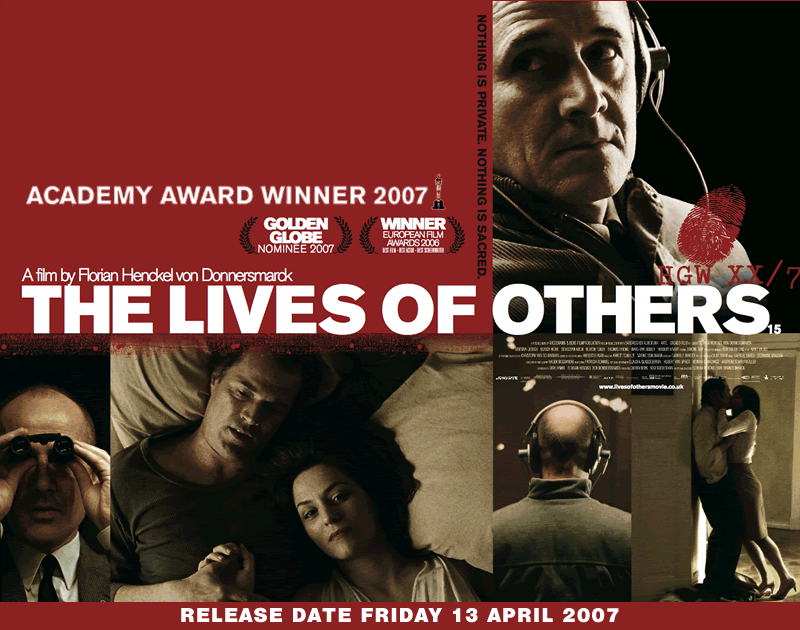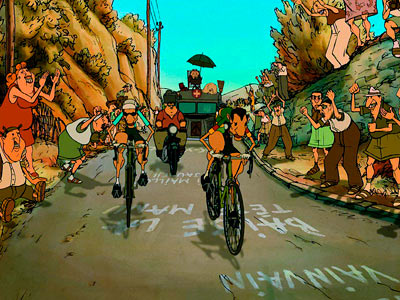In the East Germany (DDR) of 1984, Stasi Stabshauptmann Gerd Wiesler interrogates a prisoner suspected of helping a friend defect to the West. The interrogation is intercut with Wiesler using the recording to instruct a class on methods of interrogation. He points out several ways the Stasi can extract information from suspects being interrogated, by denying them sleep and by repeatedly asking the same questions. Canned answers, he states, are a sure sign of guilt.
Wiesler's superior, Lt. Colonel Grubitz, assigns him to spy on playwright Georg Dreyman, who, true to appearance, has been a supporter of the regime. Nonetheless, Wiesler thinks he is worth watching; Grubitz disagrees. However, Grubitz willingly issues the order to secretly bug Dreyman's flat, installing numerous small microphones, when asked to do so by a powerful minister. When he notices that a neighbor had observed the work of the flat bugging, Wiesler pays the woman a visit and easily intimidates her into staying silent. In the attic above the apartment, Wiesler and another agent listen to everything that goes on there, including the most intimate affairs of the occupants, and summarize everything in their reports. The uprightness of the people living in the flat begins to undermine Wiesler's views.
Wiesler soon learns the real reason behind the Stasi's surveillance of Dreyman. A Central Committee member named Bruno Hempf covets Dreyman's live-in girlfriend, actress Christa-Maria Sieland. Dreyman's imprisonment would rid Hempf of a rival. Wiesler, an idealistic believer in the socialist regime, is disgusted by the abuse of power this represents.
Meanwhile, Sieland has been engaging in sexual relations with Minister Hempf, on whom she relies to supply her with prescription drugs to which she is addicted. She is revolted by this contact, but afraid of rejecting the advances of a man capable of completely destroying her career and her life. Due to Captain Wiesler's subtle intervention, Dreyman witnesses the minister's car dropping off Sieland, and realizes what has been going on. A week later, he implores her to end the affair. However, Sieland clearly feels she cannot take that risk. She makes the point that they are both in bed with the state in order to be allowed to continue their artistic careers. Ignoring Dreymann's pleas, Sieland leaves to meet with Hempf.
Later, at a local bar, Wiesler approaches her and, posing as a fan, says that her talent is so great that she does not need any powerful supporter. Deeply touched, Sieland informs Wiesler that he is "a good man" and departs. Later, Wiesler is pleased to learn from his Stasi fellow-eaves-dropper that Sieland immediately returned to Dreyman, promising never to see Hempf again.
Although a loyal and believing communist, Dreymann dislikes the way his blacklisted colleagues are treated by the State. Although he approaches Hempf about one such friend, stage director Albert Jerska, the minister coldly refuses to intervene in a policy that has kept Jerska from working as a director for seven years. Later, at Dreyman's birthday party, Jerska gives Dreyman the sheet music to a piece titled "Sonata for a Good Man." Shortly afterwards, Jerska hangs himself.
Enraged, Dreymann arranges to anonymously publish an article on concealed suicide rates in the GDR in the West German magazine Der Spiegel. As all typewriters are registered with the Stasi, Dreyman uses a miniature typewriter smuggled in from the West, which he hides under the threshold between two rooms of his apartment. It becomes important that the ribbon of this typewriter is red only. Before discussing sensitive issues in the flat, Dreyman and his friends try to test whether the flat is bugged by a feigned attempt at smuggling. However, out of compassion, Wiesler cannot bring himself to pass on the information. As a result, the conspirators think that the flat is not bugged.
Though Wiesler originally intended his inactivity to be a one-time move, he continues to lie in his reports to protect Dreyman and reduces surveillance hours in order to eliminate his assistant. Wiesler feels increasingly isolated and alone, but begins to feel more of a kinship with his fellow human-beings. He steals a book of Brecht off Dreyman's desk and reads it himself. For perhaps the first time in his career, he refrains from following up a lead on a possible dissident when a neighbor child quotes a comment critical of the Stasi, which his father had made. He tries to create more human contact by hiring a prostitute, but she suggests that just then she has no time reserved for him other than for the act itself, and must move on to her next client.
Eventually, Dreyman and his friends finish the article and it is published, infuriating the East German government. Through an agent in the West, the Stasi obtains the typed manuscript only to learn that it was written on an unregistered typewriter with red ink.
Meanwhile, Minister Hempf, seething with hatred at being jilted by Sieland, orders Grubitz to destroy her. He informs Grubitz that Sieland has been buying prescription drugs illegally (it is implied she was relying on Hempf to protect her if she was caught). Later, Grubitz and his men catch her purchasing these drugs. She is arrested and, under pressure, reveals Dreyman's authorship of the Spiegel article. The flat is torn apart by the Stasi, but the typewriter remains elusive. After this failure, Grubitz calls in Wiesler to interrogate Sieland but warns him that a failure to produce results will cost them both.
As Grubitz watches through a one way mirror, Wiesler interrogates Sieland with the same flawlessness that characterised him for many years and subtly referring to their earlier conversation. She tells him where the typewriter is hidden. Grubitz then leads a second search through Dreyman's apartment, now that the location of the typewriter is known. As Grubitz prepares to open the compartment, Sieland, upon seeing Dreymann's horrified expression as he realises that she had disclosed the location of the typewriter, runs out of the apartment. However, the typewriter has vanished, much to the shock of both Grubitz and Dreyman. It emerges that Wiesler had rushed to the apartment, broken in while Dreymann was out and removed the typewriter, which he hides in his car. At the same time, a guilt-ridden Sieland rushes out into the street and throws herself in front of a truck. Wiesler, waiting by his car, witnesses the ensuing collision and tells her that he has already removed the typewriter. Dreyman arrives at the scene and Sieland dies in his arms. Believing that she removed the typewriter to protect him, he weeps unconsolably. Grubitz makes a polite but perfunctory claim of sympathy and leaves with Wiesler.
In the aftermath, the surveillance is called off. Certain that Wiesler has somehow interfered with the investigation, Grubitz demotes his friend to Department M, where he must steam open letters all day. He is also given a promotional ban until he retires in 20 years. Four years and seven months later, Wiesler is opening letters when a co-worker with a radio notifies him of the fall of the Berlin Wall. Elated, Wiesler and his co-workers silently leave.
After German reunification, Dreyman, who thought he had been able to publish his article because his flat was not bugged, learns from Minister Hempf that to the contrary, he was under full surveillance all along, and uncovers the microphones and surveillance material in his flat, much to his astonishment. Probing his Stasi files (opened to the public after Reunification), he learns that Sieland was released far too late to have removed the typewriter. To his shock, Dreymann comes to the realization that Stasi Agent "HGW XX/7" deliberately covered up his deeds against the state, such as the writing of the suicide article. On the final report, a smudge of red ink reveals Wiesler's contact with the typewriter. Deeply moved, Dreyman succeeds in locating Wiesler and watches from a distance as the former agent goes about his new job of delivering advertising leaflets.
Two years later, Dreyman publishes his first new work since Sieland's death, a novel entitled Sonata for a Good Man. As Wiesler sees the book advertised in a bookstore he passes on the street, the film seems to be inviting the viewer to wonder whether this title causes him to recall Sieland's calling him "a good man" in their brief encounter in the bar nine years before. (This a crafted internal resonance by the filmmaker, however much we would like it to be Dreyman's tribute to Wiesler, as Dreyman knew nothing of this). However, this foreshadowing is realized as inside the bookstore, Wiesler finds that the book is dedicated "To HGW XX/7, in gratitude". As he purchases the book, he is asked if he wants it gift-wrapped. With the camera framing his face in a masterfully composed shot, conferring on him a subtly luminous, almost ennobled quality, Wiesler declines with a poignant double entendre, saying wistfully, "No, it's for me."
[edit] Production
Henckel von Donnersmarck's parents were both from East Germany. He has said that, on visits there as a child before the Berlin Wall fell, he could sense the fear they had as subjects of the state.[5]
He said the idea for the movie came to him when he was trying to come up with a movie scenario for a film class. As he listened to a piece of music, he recalled Maxim Gorky's anecdote about Lenin listening to Beethoven's Appassionata.[1] Gorky wrote:
"I know of nothing better than the
Appassionata and could listen to it every day. What astonishing, superhuman music! It always makes me proud, perhaps naively so, to think that people can work such miracles!" Wrinkling up his eyes, Lenin smiled rather sadly, adding: "But I can't listen to music very often. It affects my nerves. I want to say sweet, silly things and pat the heads of people who, living in a filthy hell, can create such beauty. One can't pat anyone on the head nowadays, they might bite your hand off. They ought to be beaten on the head, beaten mercilessly, although ideally we are against doing any violence to people. Hm—– what a hellishly difficult job!
[6]
Henckel von Donnersmarck told a New York Times reporter: "I suddenly had this image in my mind of a person sitting in a depressing room with earphones on his head and listening in to what he supposes is the enemy of the state and the enemy of his ideas, and what he is really hearing is beautiful music that touches him. I sat down and in a couple of hours had written the treatment." The screenplay was written during an extended visit to his uncle's monastery, Heiligenkreuz Abbey[7].
Henckel von Donnersmarck had difficulty getting financing for the $2 million film. Podhoretz speculated that the reason was a reluctance on the part of the film industry to confront the horrors of East German Communism, although he says it is rich with dramatic possibilities. That may also explain why the organizers of the Berlin Film Festival refused to accept it as an official entry for 2006, the critic wrote.[6]
http://en.wikipedia.org/wiki/The_Lives_of_Others



































 The movie was good the men dance it was funny he dance he was good dancer with the girl his firends dances with him . He ride his bike to the trirn to work.
The movie was good the men dance it was funny he dance he was good dancer with the girl his firends dances with him . He ride his bike to the trirn to work.






